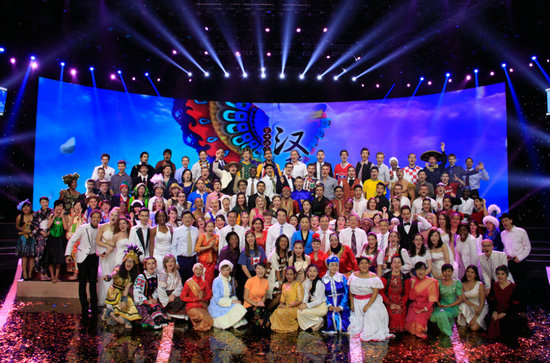
On August 3, I was invited to attend the finale and closing ceremony of the 13th Chinese Bridge Chinese Proficiency Competition for Foreign College Students. This contest, organized jointly by the Confucious Institute Headquarters (Hanban), the Hunan provincial government and Hunan TV, was held, unsurprisingly, in Changsha, capital of the province.
Launched in 2002, the contest is open to all foreign college students who study Chinese. The candidates are first chosen in their home countries in the spring, and the final contest is held in China during the summer. After development over the past decade, today the contest includes participants from 80 countries on five continents, of every tongue and ethnicity.
A Contest to Unite Peoples
As its name indicates, for founder Xu Jialu, the contest is a means to bring together young people from all backgrounds with a common love for the Chinese language and culture. This year, 126 candidates came to Changsha to vie for the prize. There are five prizes for the champion of each continent (Africa, Asia, the Americas, Europe, and Oceania), plus the grand prize of the world’s best. This year, a Brazilian girl, Munica Cunha da Silva, top of the Latin American contingent, won the title. The continental prizewinners were an Australian, a Korean, a Russian, and a Zimbabwean, as well as the Brazilian finalist.
In addition to the contest for college students, the Chinese Bridge has several offshoots. There is a similar contest for high school students, and another version for foreigners studying in China, which was transformed this year into a general contest for all foreigners. The prizewinner, a young Russian named David, had already participated in the older format in 2012. I won the prize for the fourth contest for foreign students in China, which was broadcast by CCTV International.
The New Contest
This year’s program is distinguished by the support of Hunan TV, one of China’s most popular broadcasters. Hunan TV has a reputation for trendy, high-quality productions and has attracted large audience from all age groups. The contest’s organizers hence chose to align with the station to broaden the event’s popularity. It was broadcast at prime time every evening in August, with ratings at a steady high throughout.
This year’s contest was even more riveting, thanks to changes in format, formerly very simple: a series of questions, improvisations and other onstage performances. This year the contest is pushing its boundaries. The organizers want to “take the contest out of the box” and to let candidates see the country. In part this is to prevent the contestants – some of whom are visiting China for the first time – from being put off by the media coverage. The film crew therefore brought this year’s contestants to Xi’an, capital of Shaanxi Province and capital of several ancient dynasties. They have also traveled to Anhua, the town of black tea, in Hunan Province, as well as Jingdezhen, capital of Chinese porcelain, in Jiangxi Province.
We Recommend:
